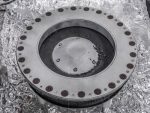Interesting news from outer space
Pharyngula 2023-11-16
You know we sent a probe, OSIRIS-REx (ugh, it’s a contrive acronym — I hate the name), to an asteroid name Bennu (better), and it has returned to Earth with a load of debris. It’s a big deal to crack this probe open, because they really want to avoid contamination, and we won’t see the results of a thorough analysis for a while yet, but NASA has examined the stuff outside the main container, and it’s promising.
So what’s the big deal about recovering pristine samples from the surface of an asteroid? The big deal is that Bennu, an asteroid in a near-Earth orbit that is about one-half kilometer across, is believed to be a time capsule for the types of rocks and chemicals that existed when the planets formed in our Solar System more than 4 billion years ago. By studying Bennu, scientists are looking back to that primordial era when Earth began transitioning from an extremely hot world with a hellish surface environment into something more like a mud ball.
Poking these pebbles and rocks with sophisticated equipment here on Earth may allow Lauretta and the other scientists to answer questions about how terrestrial planets like Earth and Mars formed and possibly whether asteroids seeded Earth with the building blocks for life.
In a preliminary analysis of some of the dust, Lauretta said scientists hit the jackpot with a sample that is nearly 5 percent carbon by mass and has abundant water in the form of hydrated clay minerals. It is highly plausible that asteroids like this delivered the vast majority of the water now found in Earth’s oceans, lakes, and rivers billions of years ago.
By piecing together clues from the asteroid dust—both its water and organic molecules—the scientists believe they may better understand how Earth went from an uninhabited mudball to the world teeming with life today.
“This is incredible material,” said Daniel Glavin, a co-investigator on the mission. “It’s loaded with organics. If we’re looking for biologically essential organic molecules, we picked the right asteroid, and we brought back the right sample. This is an astrobiologist’s dream.”
Cool, but not at all surprising. This is what we’d expected — we already knew space was full of organic molecules, this isn’t the 19th century when vitalism and the belief that organic chemistry could only be perpetrated by living organisms.
I look forward to the results, but I predict that they will find…amino acids, nucleotides, simple sugars, etc. All the basics you need to make an apple pie. The universe provides.
